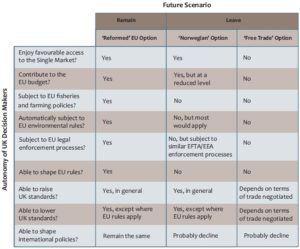Three years on from The EU Referendum and the UK Environment

Three years ago, on 11 April 2016, we launched our first review on the EU referendum and the UK’s environment. In this 14-author, 158-page document, we tried to answer a question we would find ourselves drawn back to repeatedly: how has EU membership affected UK environmental policy and governance and what might change in the event of a vote to Remain or Leave?
This three-year milestone offers us a timely opportunity to reflect on our research to date. What did we get right and wrong? And are the versions of Brexit which currently appear most likely significantly different from the scenarios we laid out in Spring 2016?

Brexit scenarios from The EU Referendum and the UK Environment.
In our report we argued that the EU has helped to modernize the UK’s environmental policies since 1973, that the relationship between the EU and UK has been two-way and is fairly similar to that enjoyed with the other 27 EU Member States.
Compared to other analysis published ahead of the referendum (by the House of Commons Environmental Audit Committee or the Institute for European Environmental Policy) our report stood out because of its joint consideration of policy and governance issues. We discussed how UK political parties, public administration and the law had adapted to EU environmental policy and to the EU more generally. This distinction between policy and governance was to become much more prevalent in our subsequent work, as evidenced by our warnings about zombie legislation and governance gaps in the summer of 2016.
Some of this early discussion of governance issues has aged very well. After two Article 50 extensions to 12 April and now to 31 October, it is heartening to be reminded, by Prof Jo Scott that ‘It is widely accepted that the two-year negotiation window may be too short to permit the conclusion and ratification of a withdrawal agreement’. Overall Jo Scott’s chapter on the legal nature of EU membership, the role of the Court of Justice of the European Union and what legal challenges leaving raises is a whistle-stop tour of some of the key issues Westminster has faced over the last three years – from ‘Henry VIII’ power and the need to grandfather EU legislation into UK law, to the loss of membership of EU agencies, debates on whether to retain EU environmental principles and how devolution would make this all the more complex.
Our report also contained gaps. While it sketched out the legal challenges of Brexit, we did not foresee the political turn to a Green Brexit: no one expected the Conservatives’ rhetorical commitment to the environment. Prof Neil Carter’s chapter on party politics and the environment is a stark reminder of how much the politics of Brexit & the environment has changed since 2016. He suggested that growing partisanship and the push by Eurosceptic Conservative MPs for a ‘Singapore on the Thames’ model of deregulation would lead to the removal or dilution of environmental policy. While that scenario could still come to pass, it is notable that it has not yet done so.
Yet, irrespective of the current government’s Green Brexit agenda, one of our main points remains valid: after Brexit, in policy areas not covered by EU law, UK environmental ambition will wax and wane solely based on the political will of its government, free from the EU’s legal lock which made it so difficult to dismantle and weaken EU environmental policies.
Another notable gap was around devolution. As Brexit & Environment grew as a network over the last three years, we have engaged with stakeholders and parliaments, produced research on how Brexit is affecting environmental governance in all parts of the UK; where common frameworks are needed and how to maintain cooperation on environmental matters beyond Brexit.
Where next for Brexit & Environment? As a network, we have responded to over twenty-five parliamentary inquiries on Brexit issues since 2016 and issued a number of detailed reports and blog posts. We plan to continue engaging with the development of future environmental, agricultural and fisheries policies across the UK.
Going back to our April 2016 argument that the EU-UK influence was a two-way street, we hope to be able to spend more time studying the impact of Brexit on the EU and its environmental ambitions. Finally, we will continue to engage with broader discussions on how UK governance should change to deliver Brexit in a way that works for all its constituent parts – contributing to general debates about Brexit from our unique environmental vantage point.
About the author
Dr Viviane Gravey is a Lecturer in European Politics at Queen’s University Belfast and Co-chair of the Brexit & Environment network.




